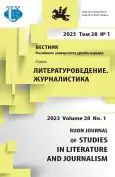Food culture in Oonya Kempadoo’s All Decent Animals and Buxton Spice
- 作者: Banerjee I.1, Dubey R.2
-
隶属关系:
- Pt. Ravishankar Shukla University
- Govt. D.B. Girls’ P.G. College
- 期: 卷 28, 编号 1 (2023)
- 页面: 51-60
- 栏目: LITERARY CRITICISM
- URL: https://journal-vniispk.ru/2312-9220/article/view/319042
- DOI: https://doi.org/10.22363/2312-9220-2023-28-1-51-60
- EDN: https://elibrary.ru/JCKISO
- ID: 319042
如何引用文章
全文:
详细
The role of food culture in the construction of collective identity remains indispensable, considering that it results from consistent and prolonged practice by the given population. In the particular case of postcolonial literature, cultural markers such as food, clothing, rituals etc., act as powerful tools of sociocultural representation. In All Decent Animals (2013) and Buxton Spice (1998), Oonya Kempadoo posits the characters as the embodiments of various levels of association with the traditional culinary practices thereby showing their differential sense of cultural rootedness against the multicultural milieu of the novels’ settings. The study aims to extract such instances from the novels that show the impact of food culture in the creation of a common memory, hearkening back to the shared history of the characters. The authors concluded, that something as mundane as food occupies a pivotal role in co-navigating the characters’ journey from self-doubt to self-acceptance. The effect of food culture in eliciting an inclination towards one’s ethnic roots is considered, while also touching upon the matter of developing a sense of cultural, familial and individual identity by means of foodways.
作者简介
Isha Banerjee
Pt. Ravishankar Shukla University
编辑信件的主要联系方式.
Email: banerjeeisha01@gmail.com
ORCID iD: 0000-0002-7010-5225
research scholar
Raipur, Republic of IndiaRashmi Dubey
Govt. D.B. Girls’ P.G. College
Email: rashmi@dbgirls.org
ORCID iD: 0000-0002-0640-1492
Dr, Assistant Professor
Raipur, Republic of India参考
- Beushausen, W., Brüske, A., Commichau, A., Helber, P., & Kloß, S. (Eds.). (2014). Caribbean food cultures: Culinary practices and consumption in the Caribbean and its diasporas. Bielefeld: Transcript.
- Dwyer, J., & Freitas, J. (2013). Food culture. In B. Caballero, L. Allen & A. Prentice (Eds.), Encyclopedia of Human Nutrition (3rd ed., vol. 2, p. 289). Academic Press.
- Erll, A. (2008). Cultural memory studies: An introduction. In A. Erll & A. Nünning (Eds.), Cultural Memory Studies: An International and Interdisciplinary Handbook (p. 5). Berlin: Walter de Gruyter.
- Houston, L.M. (2005). Food culture in the Caribbean. In K. Albala (Ed.), Food Culture around the World. Westport, CT: Greenwood Press.
- Huber, S. (2014). You are what you cook: Preparing food, creating life in Treme. In W. Beushausen, A. Brüske, A. Commichau, P. Helber & S. Kloß (Eds.), Caribbean Food Cultures: Culinary Practices and Consumption in the Caribbean and Its Diasporas (p. 69). Bielefeld: Transcript.
- Kempadoo, O. (1999). Buxton spice. London: Phoenix.
- Kempadoo, O. (2013). All decent animals. New York, NY: Farrar, Straus and Giroux.
- Lévi-Strauss, C. (1964). The Opossum’s cantata. The Raw and the Cooked: Introductions to a Science of Mythology (vol. 1, p. 164). (J. Weightman & D. Weightman, Trans.). New York, NY: Harper & Row.
- Long, L.M., Eleuterio, S., & Reed, J.L. III (2020). Keywords: Exploring cultural differences through the lens of food. (p. 8). Center for Food and Culture. Retrieved Deсember 12, 2022, from https://foodandcultureorg.files.wordpress.com/2020/05/cfac.keywords-may15.2020.pdf
- Mehta, B. (2004). Introduction: Mapping Indo-Caribbean women’s writing. Diasporic (Dis) Locations: Indo-Caribbean Women Writers Negotiate the Kala Pani (p. 25). University of the West Indies Press.
- O’Neill, J.W. (2010). Food, sex & violence: A decolonizing feminism in Caribbean literature. The People, Ideas, and Things Journal. Retrieved Deсember 12, 2022, from https://pitjournal.unc.edu/article/food-sex-violence-decolonizing-feminism-caribbean-literature
补充文件









